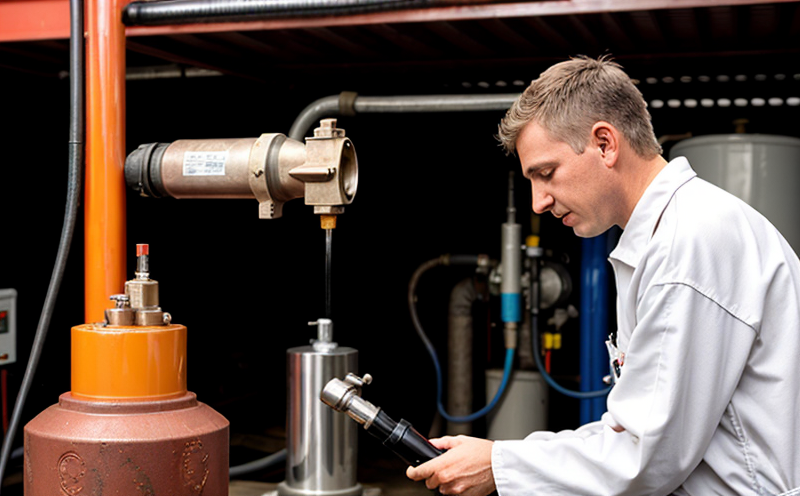ISO 8754 Sulfur Content Testing of Aviation Fuels
The ISO 8754 standard specifies a method for determining the sulfur content in aviation fuels, which is crucial for ensuring compliance with international regulations and industry standards. The presence of sulfur compounds can lead to significant issues such as increased engine wear, formation of acidic by-products, and potential operational disruptions. This testing plays a pivotal role in maintaining fuel quality and enhancing safety across the aerospace sector.
Aviation fuels are subjected to strict quality control measures before they enter commercial use. The stringent requirements for sulfur content are part of broader efforts to minimize environmental impact and improve engine performance. Compliance with ISO 8754 ensures that aviation fuel suppliers meet the necessary standards, thereby protecting both operational efficiency and passenger safety.
The test procedure outlined in ISO 8754 involves several steps: sample preparation, dilution if necessary, and subsequent analysis using advanced spectroscopic techniques like infrared spectrometry or atomic absorption spectroscopy. The method is designed to provide accurate and precise results, which are essential for maintaining the integrity of fuel quality.
Understanding the significance of sulfur content in aviation fuels is critical for various stakeholders within the aerospace sector. For quality managers, this test ensures that suppliers deliver products meeting specified standards. Compliance officers rely on it to verify adherence to regulatory requirements. R&D engineers use these results to refine formulations and improve fuel performance. Procurement teams depend on accurate testing data to make informed decisions about supplier selection.
The accuracy and reliability of ISO 8754 sulfur content tests are paramount, given the high stakes involved in aviation operations. Deviations from acceptable limits can lead to costly repairs, safety hazards, and reputational damage for airlines. Regular monitoring through this test helps operators maintain optimal fuel quality throughout the lifecycle of their aircraft.
Technological advancements have made ISO 8754 testing more accessible and efficient. Modern laboratories equipped with state-of-the-art instrumentation offer faster turnaround times while maintaining high levels of accuracy. This capability is particularly valuable for airlines operating international routes where compliance with global standards is essential.
In summary, ISO 8754 sulfur content testing is a fundamental aspect of aviation fuel quality control. It ensures that fuels meet stringent industry and regulatory requirements, thereby supporting safe and efficient operations within the aerospace sector.
Applied Standards
- ISO 8754: Specifies the method for determining sulfur content in aviation gasoline (avgas) and jet fuel (JP-10, JP-5, JP-8).
- ASTM D4294: Provides additional methods for measuring sulfur in aviation fuels.
The application of these standards ensures that the testing process is consistent and reliable across different laboratories. Compliance with ISO 8754 helps fuel suppliers meet international regulatory requirements, which are essential for global trade and safety.
Why Choose This Test
- Precision: The ISO 8754 method provides highly accurate measurements of sulfur content in aviation fuels.
- Rigorous Compliance: Ensures strict adherence to international and industry standards, enhancing safety and reliability.
- Environmental Impact Reduction: By minimizing sulfur compounds, this test contributes to reduced emissions and environmental pollution.
- Operational Efficiency: Regular testing ensures optimal fuel performance, leading to efficient engine operation and extended component life.
The precision of ISO 8754 tests is critical for maintaining the quality standards required by airlines and aviation regulatory bodies. By choosing this test, stakeholders ensure that their fuels meet stringent international regulations, thereby safeguarding operational efficiency and safety.
International Acceptance and Recognition
- Airlines: ISO 8754 testing results are widely accepted by major airlines around the world, ensuring consistent fuel quality.
- Regulatory Bodies: Compliance with this standard is recognized by aviation regulatory bodies such as the Federal Aviation Administration (FAA) and European Union Aviation Safety Agency (EASA).
- Suppliers: Suppliers adhering to ISO 8754 are trusted for their commitment to quality, which enhances market credibility.
The widespread acceptance of ISO 8754 testing underscores its importance in the global aviation industry. Airlines and regulatory bodies rely on these results to ensure that fuels meet international standards, promoting safety and reliability across borders.





